

España retrocede en innovación. España sigue sin subirse al tren de la innovación europea.

Kenneth Rogoff identifies several obstacles to keeping living standards on an upward trajectory. Exit from comment view mode.
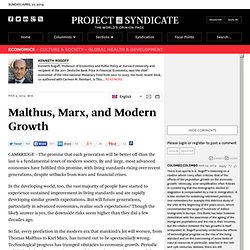
Click to hide this space CAMBRIDGE – The promise that each generation will be better off than the last is a fundamental tenet of modern society. By and large, most advanced economies have fulfilled this promise, with living standards rising over recent generations, despite setbacks from wars and financial crises. In the developing world, too, the vast majority of people have started to experience sustained improvement in living standards and are rapidly developing similar growth expectations. But will future generations, particularly in advanced economies, realize such expectations? So far, every prediction in the modern era that mankind’s lot will worsen, from Thomas Malthus to Karl Marx, has turned out to be spectacularly wrong.
As a result, Malthus’s concerns about mass starvation have failed to materialize in any peaceful capitalist economy. Mercado Integrado Latinoamericano. The Mercado Integrado Latinoamericano, more commonly known as MILA, is a program that integrates the stock exchange markets of Chile, Colombia, and Peru.
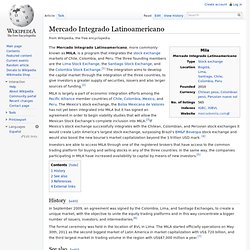
The three founding members are the Lima Stock Exchange, the Santiago Stock Exchange, and the Colombia Stock Exchange.[1] The integration aims to develop the capital market through the integration of the three countries, to give investors a greater supply of securities, issuers and also larger sources of funding.[2] MILA is largely a part of economic integration efforts among the Pacific Alliance member countries of Chile, Colombia, Mexico, and Peru. Investors are able to access MILA through one of the registered brokers that have access to the common trading platform for buying and selling stocks in any of the three countries.
In the same way, the companies participating in MILA have increased availability to capital by means of new investors.[5] History[edit] The formal ceremony was held in the location of BVL in Lima.
Mahbub ul Haq. Biography[edit] Childhood and education[edit] Mahbub-ul-Haq was born in pre-independence Punjab province on February 24, 1934.[4] His teenage years saw religious violence associated with the independence of Pakistan and India in August 1947.[4] He and his family narrowly escaped from being killed by the Sikhs in one of the trains heading to Pakistan.

The nature of the religious violence left a lasting impression on Mahbub-ul-Haq.[4] After reaching Lahore, Haq was given government-sponsored housing and decided to continue his education. Consenso de Washington. Joseph Stiglitz. Joseph Eugene Stiglitz, ForMemRS, FBA (born February 9, 1943) is an American economist and a professor at Columbia University. He is a recipient of the Nobel Memorial Prize in Economic Sciences (2001) and the John Bates Clark Medal (1979). He is a former senior vice president and chief economist of the World Bank, and is a former member, and Chairman of the Council of Economic Advisers.[2][3] He is known for his critical view of the management of globalization, free-market economists (whom he calls "free market fundamentalists"), and some international institutions like the International Monetary Fund and the World Bank. Dependency Theory. Dependency Theory. Joseph Schumpeter.
Joseph Alois Schumpeter (German: [ˈʃʊmpeːtɐ]; 8 February 1883 – 8 January 1950)[1] was an Austrian-born American economist and political scientist.
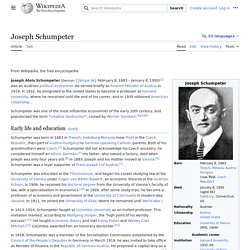
He briefly served as Finance Minister of Austria in 1919. In 1932 he became a professor at Harvard University where he remained until the end of his career. One of the most influential economists of the 20th century, Schumpeter popularized the term "creative destruction" in economics.[2] Life[edit] Schumpeter was born in Triesch, Habsburg Moravia (now Třešť in the Czech Republic, then part of Austria-Hungary) in 1883 to Catholic German-speaking parents. Schumpeter began his career studying law at the University of Vienna under the Austrian capital theorist Eugen von Böhm-Bawerk, taking his PhD in 1906. In 1918, Schumpeter was a member of the Socialization Commission established by the Council of the People's Deputies in Germany. From 1925 to 1932, Schumpeter held a chair at the University of Bonn, Germany.
Amartya Sen. Amartya Kumar Sen (Bengali: অমর্ত্য সেন; born 3 November 1933) is an Indian economist and philosopher who since 1972 has taught and worked in the United Kingdom and the United States.
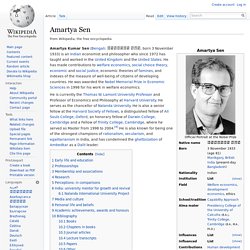
He has made contributions to welfare economics, social choice theory, economic and social justice, economic theories of famines, and indexes of the measure of well-being of citizens of developing countries. He was awarded the Nobel Memorial Prize in Economic Sciences in 1998 for his work in welfare economics. He is currently the Thomas W. Lamont University Professor and Professor of Economics and Philosophy at Harvard University. He serves as the chancellor of Nalanda University. El Desarrollo económico de la América Latina y algunos de sus principales problemas. Raúl Prebisch (1986)
El Desarrollo económico de la América Latina y algunos de sus principales problemas.
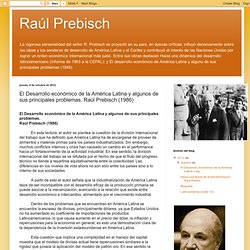
Raúl Prebisch (1986) En esta lectura, el autor se plantea la cuestión de la división internacional del trabajo que ha definido que América Latina ha de encargarse de proveer de alimentos y materias primas para los países industrializados. Sin embargo, muchos conflictos internos y crisis han causado un cambio en el performance hacia un fortalecimiento de la actividad industrial. En ese sentido, la división internacional del trabajo se ve refutada por el hecho de que el fruto del progreso técnico no tiende a repartirse equitativamente entre la colectividad.
Las diferencias en los niveles de vida ahora no son sólo entre los países sino a lo interno de sus sociedades. Raúl Prebisch. Raúl Prebisch y los desafíos del Siglo XXI. Prebisch_el_desarrollo_eco. La CEPAL y la teoría de la industrialización. La CEPAL y la teoría de la industrialización Valpy FitzGerald, St.
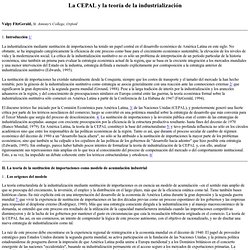
Antony's College, Oxford 1. Industrialización por sustitución de importaciones. Industrialización por Sustitución de Importaciones (ISI), llamada también modelo ISI, es una estrategia o modelo económico adoptado en el territorio latinoamericano y en otros países en desarrollo con posterioridad a la Segunda Guerra Mundial.
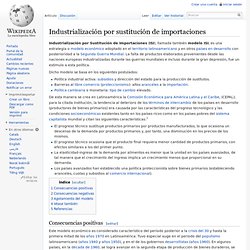
La falta de productos elaborados provenientes desde las naciones europeas industrializadas durante las guerras mundiales e incluso durante la gran depresión, fue un estímulo a esta política.